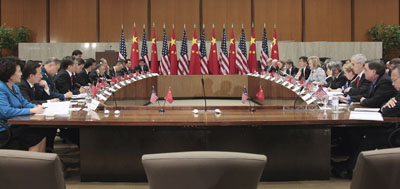Back then, we noted that China’s human rights environment was far from making progress. In fact, it had deteriorated in the past year, beginning with Liu Xiaobo’s Nobel Peace Prize in 2010, and escalating rapidly in the wake of unrest in the Middle East and North Africa. Chinese authorities’ efforts to limit its citizens’ knowledge of regime-changing demonstrations overseas and intimidate civil society figures who could potentially foment organized opposition has included the harassment and detentions of activists, online critics, and journalists both foreign and domestic. Many, such as prominent artist and social commentator Ai Weiwei, and two journalists who had reported on him in the past, have been denied due process and simply disappeared.
China refused to listen to the U.S. then, and Dai’s comment suggests that the country is not inclined to start now, especially with so many other strategic issues under discussion. The U.S. must recognize that economic cooperation relies on freedom of the press and freedom of expression–and demonstrate to China that releasing peaceful critics is the only kind of “progress” it will acknowledge going forward.
